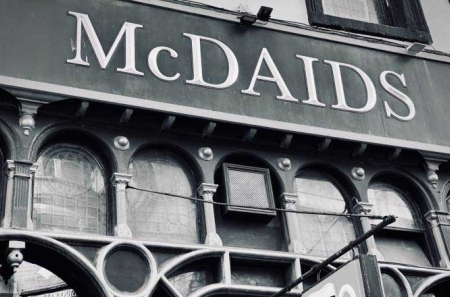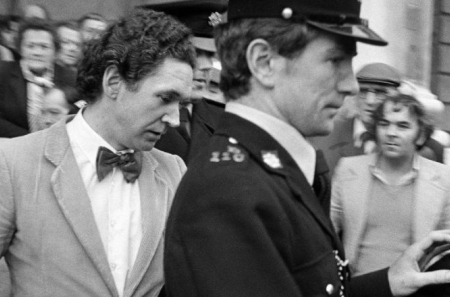
The DIB on RTÉ – Fr Patrick Peyton
21 March 2019An Esras Films documentary about Fr Patrick Peyton aired on RTE 1 on Thursday March 21 at 22:15. Dr Kate O'Malley of the DIB is a contributor. Read the DIB entry on the 'Rosary Priest', by Deirdre Bryan and Maureen Murphy.
Patrick Joseph Peyton (1909–1992), Holy Cross priest and radio and television evangelist (‘the Rosary Priest’), was born 9 January 1909 in Carracastle, near Ballina, Co. Mayo, sixth of the nine children of John Peyton (1868–1934), county road repair worker, and Mary Gillard Peyton (1871–1939) of Rathreedane, Bonniconlon, Co. Mayo. According to family tradition, the Gillards were descended from a French soldier who stayed in the Ballina area after the French invasion of 1798. Peyton was educated at Bofield and in Bonniconlon when he stayed with his maternal grandparents Robert and Kitty Gillard, but left school abruptly when his schoolmaster called him lazy. While he was drawn to a vocation and applied to the Capuchins and to the Society of African Missionaries in Cork, he lacked sufficient schooling to be admitted to the seminary. With no chance to pursue his vocation and little other opportunity for employment, Peyton and his brother Thomas sailed for America on 13 May 1928 to join their sisters who had emigrated earlier to Scranton, Pennsylvania.
Through his sister Ellen (Nellie), Peyton met Msgr Paul Kelly, rector of St. Peter's Cathedral, Scranton, who encouraged him to reconsider his vocation and paid the fees at the Christian Brothers St. Thomas High School for him and Thomas. After meeting priests of the Holy Cross during their mission to Scranton in 1929, the Peytons enrolled in the Holy Cross Minor Seminary on 9 September 1929. Patrick opted for the order's Bengal mission, but in October 1938, while studying theology in Washington, suffered a haemorrhage of the lung. He recovered from his bout of tuberculosis in time to be ordained with his brother at Notre Dame on 1 June 1941. He credited his recovery to the Virgin Mary (to whom he prayed regularly) and vowed to devote his life to restoring the custom of the family rosary.
In his first assignment as chaplain to the Holy Cross brothers and Sisters of Mercy who taught at the Vincentian Institute in Albany, New York, he enlisted student help in starting his Family Rosary organisation. Believing that radio was the best medium for a national family rosary crusade, Peyton convinced Elsie Dick, director of religious programming at the Mutual Broadcasting Company, to give him a half-hour programme. It was launched on 13 May 1945, the day President Harry S. Truman declared a day of national thanksgiving to mark the end of the war in Europe. Peyton built on that success by recruiting prominent catholics to recite the rosary on air including Bing Crosby, and the Thomas F. Sullivan family of Waterloo, Iowa, who had lost their five sons on aboard the Juneau at Guadalcanal (11 November 1942). Expanding his programming to radio theatre, Peyton broadcast on 13 February 1947 the drama ‘Flight from Home’ featuring Loretta Young and Don Ameche; it was the first in a twenty-year series. He recruited other Hollywood personalities when he moved into television and film, and a young James Dean made his film debut in Family Theatre's ‘Hill Number 1’. After Peyton completed a series of fifteen films about the mysteries of the rosary, a project largely funded by communities of American nuns, Pope Pius XII wrote to him commending him on their ‘apostolic character’.
In 1947 Peyton started organising prayer rallies in support of the Rosary Crusade in the USA and Canada. Through his friendship with Loretta Young and her husband Thomas H. A. Lewis, an advertising executive with Young and Rubican, Peyton met the copywriter Al Scalpone who created the Crusade slogans ‘The family that prays together, stays together’ and ‘A world at prayer is a world at peace’. Peyton brought his Crusade to Europe (1952, 1953), Australia (1953), Southeast Asia (1954, 1959), Africa (1955), and South America (1959, 1960–1964). When he brought the Crusade to Ireland in 1954, the meeting in Knock drew 20,000 people. His 1985 Crusade in the Philippines attracted two million participants.
Peyton, who called himself ‘Our Lady's salesman’, chronicled his Crusade in his 1967 autobiography All for Her. He was named Mayo Man of the Year in 1987. On 15 August 1990, RTÉ aired a documentary on his life and work made during one of his visits to Mayo. He had bypass surgery in 1978 for coronary artery disease, and in his later years, lived in the Little Sisters of the Poor retirement centre in San Pedro, California. He died 3 June 1992 at the age of 83 and was buried in the community cemetery at Stonehill College, North Easton, Massachusetts. His Crusade continued from the Family Rosary Headquarters at 773 Madison, Albany, New York. In October 1998 The Father Peyton Memorial Centre was opened in Attymass, Co. Mayo, to house Peyton memorabilia and photographs. His papers are at Stonehill College, Easton, Massachusetts.
Patrick Peyton, The ear of God (1954); Irish Catholic, 11 Mar., 29 Apr., 3 May 1954; Patrick Peyton, All for her; the autobiography of Father Patrick Peyton, CSC (1967); Jeanne Gosselin Arnold, A man of faith (1983); A world of prayer. The vision of Father Patrick Peyton (1987) video; RTE Guide, xiv, no. 33 (10 Aug. 1990), 8; Charles M. (‘A Trappist Monk’), Father Peyton's rosary prayer book (1991); Catholic Herald and Standard, 12 June 1992; Mayo News, 14 Oct. 1998; Michael Glazier, (ed.), The encyclopedia of the Irish in America (1999); Richard Gribble, American apostle of the family rosary, The life of Patrick J. Peyton (2005); information from Delia Ginley, director, Father Peyton Memorial Centre
© 2019 Cambridge University Press and Royal Irish Academy. All rights reserved. Not for commercial use or unauthorized distribution. Learn more about DIB copyright and permissions.



